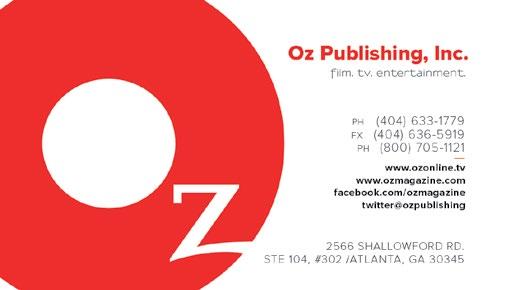

As the second largest city in Georgia, Columbus is a short 70 minute ride from Atlanta Airport. Enjoy incentives, credits, and a Camera-Ready community.

Flat Rock Studio is ready for your production.






As the second largest city in Georgia, Columbus is a short 70 minute ride from Atlanta Airport. Enjoy incentives, credits, and a Camera-Ready community.

Flat Rock Studio is ready for your production.




Cover Story: Latinos, Interrupting the Narrative in Film, p.24
Born and raised in Mexico, Daniela Cintron is a bilingual freelance journalist featured on local, national, and international media, including CNN, Telemundo, and Discover Atlanta. Her journey in media began at the age of six as a radio personality and evolved throughout the years, developing as a multiplatform journalist. With a degree in Mass Communications from Piedmont University, Cintron is currently pursuing a Graduate Certification in Digital Storytelling at Harvard University.

Feature Story: A Look Into the Mind of Mark McCray, p.30

Feature Story: Women in Music, p.36
Feature Story: DreamHack, p.40
Noah Washington was born in Richmond, VA. He is a Media Entrepreneur major at Georgia State University. He has written for multiple publications exploring culture in the entertainment industry and is currently a writer for the “National Newspaper Publishing Association” under the ”Blerd Binder” label and has been published in multiple states such as the “L.A Watts’’ times and the “Charleston Chronicle”.

Feature Story: Making Space for Hope, p.42
Alexa Rachelle Jennings was born and raised in Atlanta. She received her Bachelor’s of English, concentrating in Creative Writing from Georgia State University. She is an actor and can be seen in such shows as “Bigger” (BET +), “Dynasty” (CW), and “Greenleaf” (OWN). She has also appeared in national commercials for brands such as Sherwin Williams, AT&T, and Walmart, to name a few. She enjoys the arts and wants to be creative whenever she gets the chance.
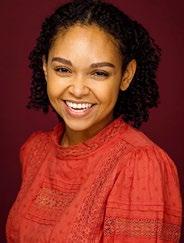
Photographer / Cover Story: Latinos, Interrupting the Narrative in Film, p.24
Ben is a regular contributor for publications and clients, including Atlanta Magazine, The Guardian, New York Times, SPANX, and American Cancer Society, to name a few. He also works with Atlanta and LA productions doing gallery and promo photography.Ben resides in Avondale Estates, GA, with his wife, three kids, and two berserk golden retrievers.

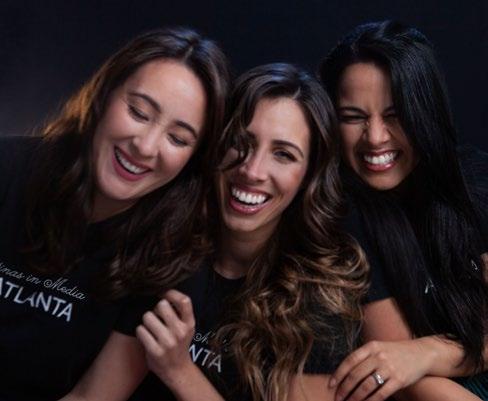





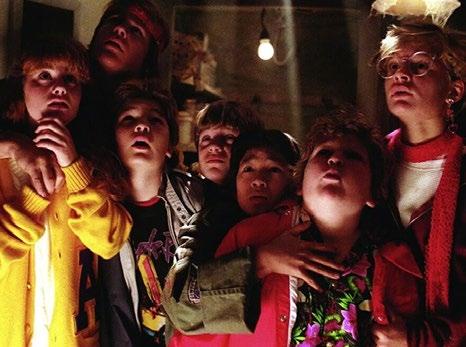
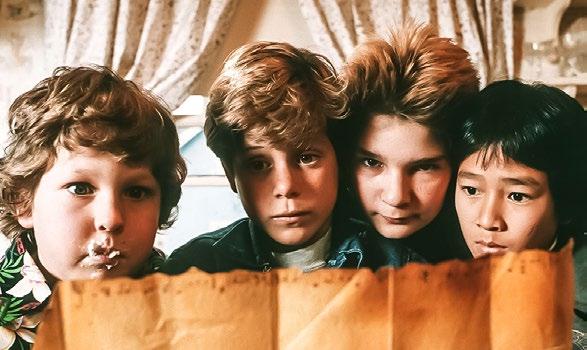
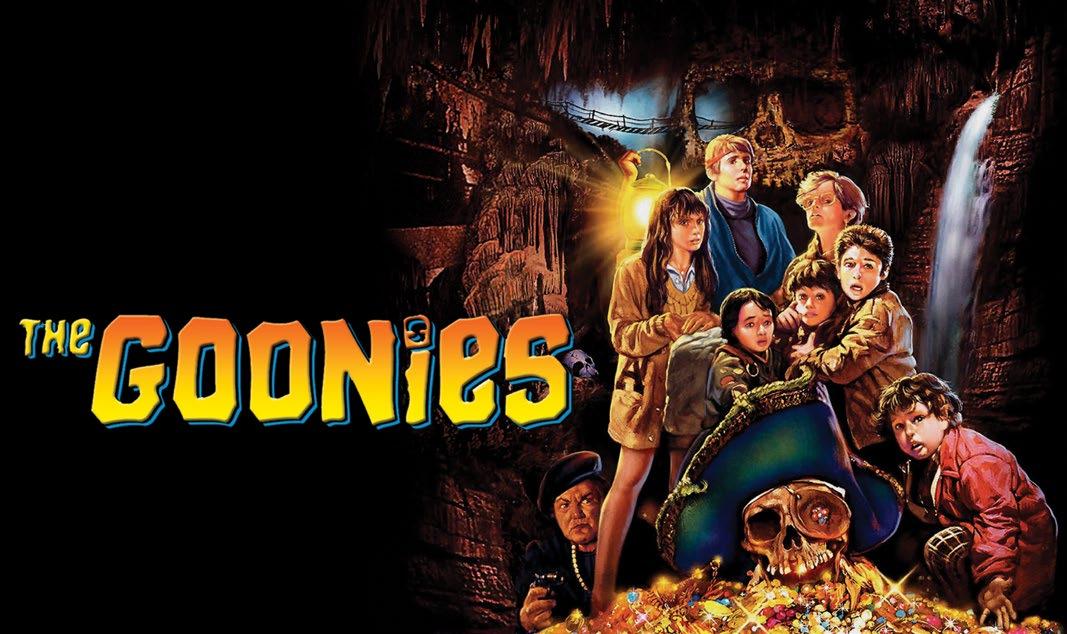
ans of The Goonies now have reason to rejoice, as the classic movie is getting a remake as a television show! The project, previously to be broadcast by Fox, has since been taken over by Disney+ and production is already underway in Newnan, Georgia. However, this television show will be no normal remake or reboot; the plot will be taking on a third dimension, following a substitute teacher named
F
Stella Cooper who is helping her students to create a remake of the 1985 film The Goonies
Sarah Watson, creator of “The Bold Type”, wrote the drama television series now titled “Our Time” and the Director and Producer of the original The Goonies who passed away in July, Richard Donner, is also credited as an Executive Producer along with Lauren Shuler Donner. The rest
of the Executive Producer board includes Gail Berman, CEO of The Jackal Group; Hend Baghdady of The Jackal Group; and Amblin Television’s Darryl Frank and Justin Falvey. Greg Mottola, Director of Superbad, was a part of the original project team under Fox and has yet to confirm his continued role of Director for the redevelopment of the series.
The short film Pap’s Manifesto is generating a new buzz as it receives selections and award after award at film festivals such as the Southern Shorts Awards and the IndieX Film Fest, as well as international festivals such as the Peachtree Village International Film festival, the French RED Movie Awards, and the Indie Shorts Awards Cannes in France.
Pap’s Manifesto was filmed in Milledgeville, Georgia, and the indie short’s plot is centered around a grief-stricken father looking to avenge his son’s death. Jeremiah Bennett, current Atlanta Chapter Chairman of the Producer’s Guild of America, produced the film with writers Chris Danuser and Casey Clark in Director roles.


Danuser, a Milledgeville native, found much of his inspiration in Flannery O’Conner’s writings. He states that “Many of Flannery’s themes touch upon a mystical power of grace, in my opinion,” and adds that he hopes to channel some of her energy into his stories; Pap’s Manifesto being one.
The film’s awards and nominations include titles such as Best Drama, Best Director, Best Made in Georgia Film, Best Screenplay, Best Cinematography, and many more to date.
Atlanta filmmaker Jasmine Alexander recently released a short film titled Body Image that depicts the unrealistic expectations of appearance fostered by today’s social media. The storyline follows a young woman seeking surgery to alter her body to appear similar to that of social media models and influencers. With Dalton Pope as Director of Photography, the film stars Jayla Reshon and Alexander herself. Body Image provides the audience with a deeper message that will long outlast its 2:12 minutes.
The short film Body Image has found great success in multiple film festivals; winning Best Women’s Film from the Krimson Horyzon International Film Festival, Best Actress from the Global

up, praying to see casting calls when it dawned on me: why wait for opportunities when I can create them,” said Alexander. Since her emergence as an Atlanta
filmmaker, she has created six short films; submitting three shorts to film festivals, including Body Image, and she plans to continue creating content that will leave its viewers wanting more.

If you are interested in watching the short film Body Image visit: https:// jazdale16.wixsite.com/my-site

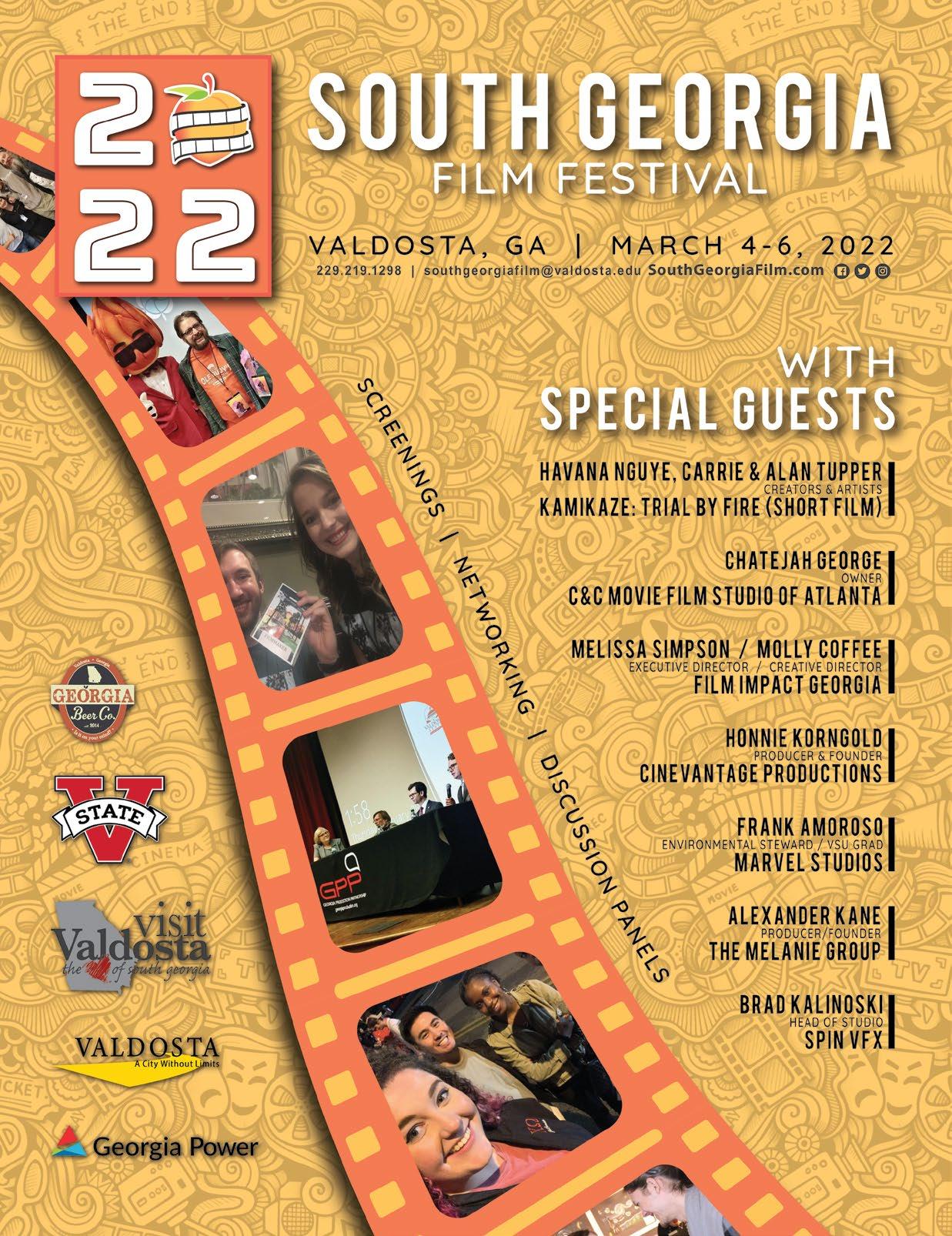

In what can now be identified as a string of events, production companies across Atlanta have recently been the target of theft; specifically high-dollar camera equipment. The Plug ATL fell victim to one of these instances of theft, losing over $100,000 of production equipment to a group of young men in the early hours of the morning on November 23rd. The production company that opened its doors a year and a half ago is located at the Phoenix Business Park and co-owned
"They went directly for our camera equipment. We have a fully furnished state-of-the-art recording studio. They didn't touch it. We had laptops, I-Pads, MacBook Pros all across the building, they didn't touch it," explained Charlene Legend. It is reported that there have been at least 35 similar break-ins throughout the metro Atlanta area in this past year, with estimated losses in the $3 million range since this past summer. However,
confirm a connection between previous break-ins and the burglary of The Plug ATL.
"We're not a huge company. We can't afford a huge hit like this and this is absolutely devastating," Legend adds. The Legends are currently having to raise money to help their small business recover from this crushing loss. Production companies are advised to remain extra cautious in the wake of these events.

-drafting furniture rentals

-foamboard & gatorboard

-seamless paper
-printing paper
-tapes & adhesives
-sp -spray paint & more!
"Raising Dion" season 2 premieres February 1, 2022. Atlanta, Georgia’s EUE/ Screen Gems Studios, the first full-service production studio complex opened in Atlanta, was the production site of the second season of the film series "Raising Dion." The Netflix original superhero drama series found immediate success upon release of its first season on the streaming service. It became one of the biggest debut shows of 2019 with over 32 million households watching in its first four
weeks on the platform and it was quickly granted renewal for a second season.
The Netflix series is based on the Raising Dion comic book series written by Dennis Liu, as well as the short film adaptation released in 2015 that gained internet popularity. Michael B. Jordan, Kenny Goodman, Kim Roth, Dennis Liu, and Charles D. King’s company MACRO are the Executive Producer Board for the Netflix series.
Production for season two was delayed due to the ongoing COVID-19 pandemic, but filming finally began in January 2021 in Atlanta, Georgia with EUE/Screen Gems Studios. EUE/Screen Gems’ 33-acre Atlanta studio complex offers 250,000 feet of production space and 11 sound stages for the production of "Raising Dion" and the complex’s convenient location, 10 minutes from the Hartsfield-Jackson International Airport, allows for greater accessibility.
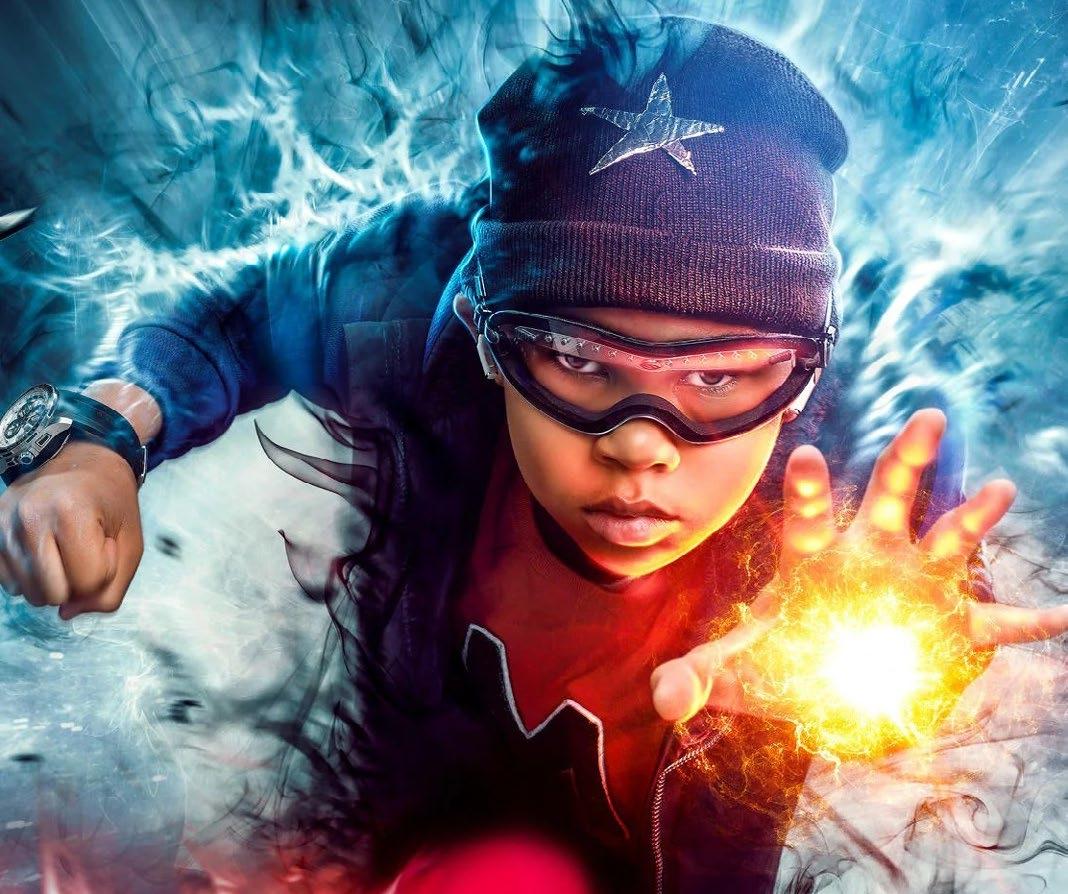



Electric Owl Studios broke ground in November to become the first LEED (Leadership in Energy and Environmental Design) gold-certified studio in the world. The six-stage, 17-acre facility will be located off I-285 south of Memorial Drive near Indian Creek Marta Station. Co-founders Michael Hahn, CEO of Capstone South Properties, and Dan Rosenfelt are bringing their combined experience in real estate and the film industry to Electric Owl Studios. Capstone is leading development of the studio, with Domain Capital serving as the capital partner. $50 million was raised to get the studios off the ground according to Hahn, a real estate developer working with operations specialist Rosenfelt.
The environmentally sustainable studios will have 140,000 in total square footage of stage space, 50,000 square feet of office space and 75,000 square feet in construction and support space. To reduce their carbon footprint, plans include efficient insulation, LED lighting, and 48 electric vehicle charging stations. Solar panels will cover 30% of their energy costs. Rainwater will be captured for use on site. They are installing high-energy HVAC systems, smart thermostats and LED lighting throughout the facility. They anticipate 15 to 20 full-time employees and up to 1,000 people on site when all stages are being utilized.

Rosenfelt explained, “We are large enough for a Marvel-size film but small enough to be considered a boutique property. We can focus on one or two big productions at a time and give them the type of attention and treatment they deserve.”


Electric Owl is slang for night watchmen in a rail yard. "We thought it was a good metaphor for what we do,” Hahn said. “We act as shepherds for productions. And it also has that energy connotation.”





Award winning actor and first time director Michael B. Jordan spotted in a new role on the set of Creed 3 in Atlanta. This time he will step behind the camera to direct as well as throw haymakers in the ring as main character Adonis Creed in the Rocky spin-off franchise. To help prepare for the added responsibilities, Jordan has credited the advice of previous Creed directors Ryan Coogler and Steven Cable Jr.

The franchise got started back in 2015 when the first Creed introduced Adonis Creed, the son of Rocky Balboa’s enemyturned-friend Apollo Creed. Just like his father before him, Adonis is determined to become a boxing champion and seeks
out the tutelage of a retired Rocky. The film was so popular that a sequel, Creed 2, was released soon after the first. This time Adonis must revisit his past as he fights the son of the man who killed his father, Viktor Drago.
One significant change is the departure of Sylvestor Stallone who played Rocky Balboa in the original movies and appeared in Adonis’s corner during the first two installments of the Creed franchise. This is not a surprise as Stallone announced that he would be retiring the beloved character following Creed 2, but it is officially the end of an era that lasted over 40 years. Now, Adonis will take center stage as the primary focus of
the story while Jordan himself also steps into an increased role.
"I've always been moving toward it,” said Jordan about his directorial goals. “When you're acting for twenty-something years, I think over time you start to evolve, your taste buds evolve as well, and you want to do something different. You want another challenge. You start to want to have an opinion and a perspective on how to tell stories. And representation really, really matters. Being so close with Ryan, and watching somebody my age, who looks like me, shoot Fruitvale Station back then, it really gave me the idea that I can do that as well.”


TThe Forsyth County town had a very dark history to begin with; it was once home to an estimated population of 1,100 Black people until three men from the town were accused of the rape and murder of a white woman named Mae Crow in the early 1900’s. The men were subsequently lynched for the suspected crime, but this was not the end of it.
White mobs called The Night Riders took it upon themselves to respond by destroying the town of Oscarville and driving the Black population out of the county through demonstrations of force such as burning down churches and businesses and firing guns into homes and at livestock. In the 1950’s, the site of these injustices and horrors found itself submerged by water, at the bottom of today’s Lake Lanier.
Black citizens of Oscarville endured. Their film titled Lanier is set to begin the filming stage in February of 2022.
“There’ve been movies that have happened at Lake Lanier, but nothing has ever hit on Oscarville or anything even close to that,” said Director, Co-Writer, and Producer William Bush-Anderson. “There’s nothing more fearful than a reallife intruder coming inside your home. You think they’re on the outside, but they may already be inside. Just that idea of that real-life horror — that’s what really drove me, aside from anything paranormal, because the best horror movies are the movies that could actually happen to you.”
The injuries and disappearances of
recent times were initially what brought this team of filmmakers to Lake Lanier, but once they delved deeper into their research of the area they realized that Oscarville would play a key role in the movie. In the opinion of the film’s Co-Producer, Cindy Kunz-Anderson, the disturbing history that lies at the bottom of Lanier is what has unleashed this paranormal activity. She believes that the series of unfortunate events at the lake are caused by spirits seeking retribution for the brutal crimes committed against Oscarville’s citizens, which is a sentiment likely to be expanded upon in the film.
“It’s not going to be pretty,” said Co-Writer, Producer and lead Actor Ali Ashtigo. “To show the scenes of this film — it’s got to be harsh, or else people aren’t going to get it, the pain of the people. In order to show that, maybe horror is the best way to do it.”


Prominent real estate and infrastructure owner, operator, lender, and developer CIM Group has announced their provision of a $72.0 million loan for Cinelease Studios - Three Ring to expand their production campus. The Georgia studio campus Three Ring was built in 2017 and is located in Covington. Cinelease Studios also owns high level studios in multiple states including New York, California, and Pennsylvania, and is credited in many popular features such as “Grey’s Anatomy” and “Westworld.”
Cinelease Studios-Three Ring is
currently located on 160 acres of land and their campus holds 110,000 square feet of sound stages, 60,000 square feet of support space, 30,000 square feet of office space, and 600 parking spots. Using this loan from the CIM Group, Cinelease will begin Phase Two of the construction process in which they plan to refurbish the existing property and expand the campus exponentially by adding another 140,000 square feet of sound stages, 115,000 square feet of support space, and 70,000 square feet of office space. The completion of Phase Two will cause the
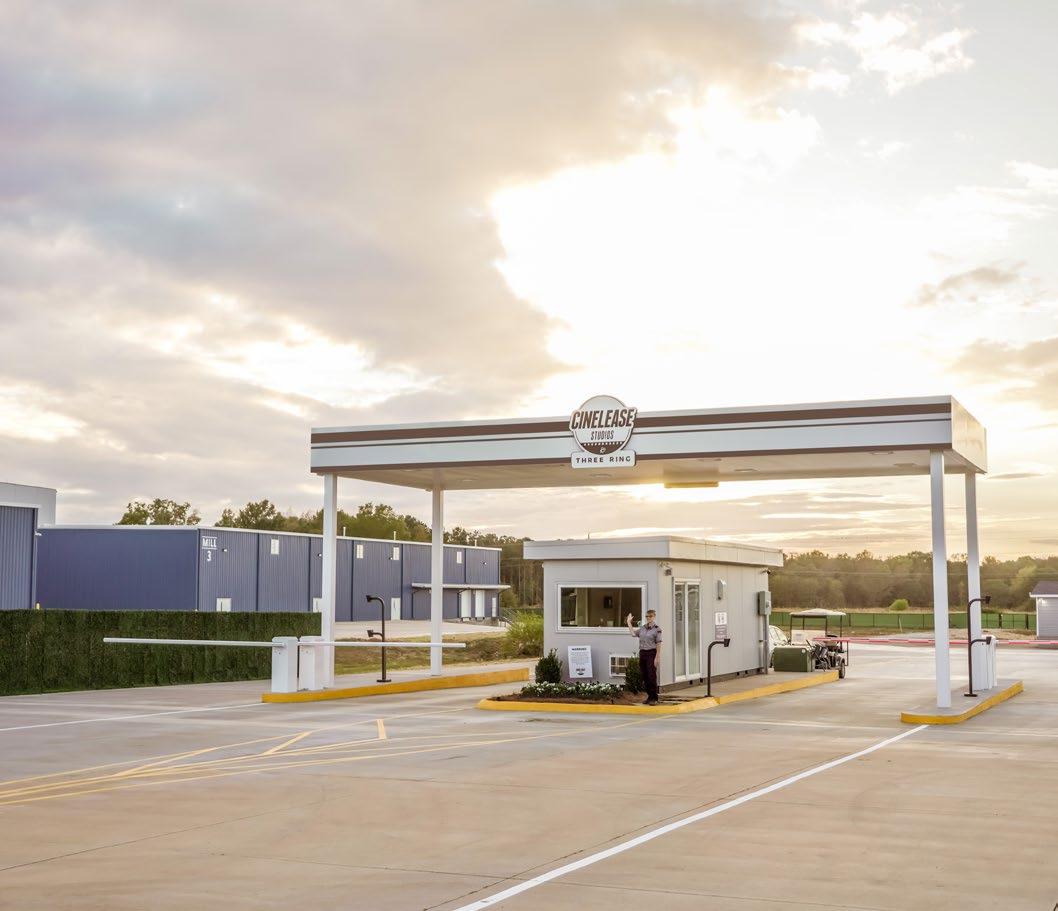
Cinelease Studios-Three Ring to ascend into the top 3 largest studio spaces in Georgia.
Cinelease has high hopes for the future as the film industry continues to prosper in Georgia. The studio campus is conveniently located within an hour from downtown Atlanta and Hartsfield-Jackson International Airport, and less than a mile from the Covington Municipal Airport which makes it easily accessible for film crews.

The newest addition to the Marvel franchise, Spider-Man: No Way Home , has crossed the $1 billion mark at the global box office, as announced by Sony Pictures, the film’s studio, only twelve days post-release. This makes the film the quickest to reach that mark since Avengers: Endgame and Avengers: Infinity War, which reached $1 billion in five and eleven days, respectively.

The movie’s first great success can
be found in its opening status as the second largest domestic opening of all time, netting $260 million, which is also the best opening ever for the month of December, Sony, and the entire SpiderMan franchise. No Way Home, starring Tom Holland as Peter Parker and Zendeya as MJ, is the first pandemic-era film to break $1 billion, and the top grossing film of the year worldwide.
While Spider-Man is known for his
iconic scenes in which he swings on his webs between New York City skyscrapers, the Big Apple’s crowded city streets now make this far too difficult to film. Instead, the franchise found a solution in filming the majority of its scenes at Atlanta’s Trilith Studios where creative filmmaking combined with immersive visual effects allowed the studio to turn a southern city into a New York City look-alike.
“Ozark”
The highly anticipated finale of Netflix original series “Ozark” is ready to shake things up. After three successful seasons, the Emmy award-winning TV show was renewed for a fourth and final season. According to creators Bill Dubuque and Mark Williams, the new season will be longer than any of its predecessors, with 14 episodes split into two parts. The first part of Season 4 was released on January 21, 2022, and the second part’s release date remains to be determined for now.
The American crime drama tells the story of a financial advisor who gets roped into a money laundering scheme for the Mexican Cartel and, for their safety, must relocate his family from Chicago to
the Missouri Ozarks. In season four, the survival of the Byrde family is increasingly at stake, with tensions between the family and the cartel higher than ever.
Georgia provided the perfect backdrop for filming the Missouri Ozarks drama. Filming locations included Lake Allatoona, Lake Lanier, City of Savannah and Eagle Rock Studios’ soundstage complex in Norcross. A few other prominent locations include Chateau Elan in Braselton and JD’s on the Lake, which was originally built for the show but now also operates as a functional diner.
The main cast remains the same with Jason Bateman, Laura Linney, Julia Garner, Lisa Emery, Sofia Hublitz, Skylar Gaertner,
and Felix Solis all continuing their roles, but there are also a few newcomers to the cast; including Bruce Davison as retired Illinois Senator Randall Schafer, Alfonso Herrera as Javi, a member of the Navarro cartel, Verónica Falcón as Navarro's sister, and Ali Stroker as Charles-Ann.
"We're so happy Netflix recognized the importance of giving “Ozark” more time to end the Byrdes' saga right," showrunner Chris Mundy said. "It's been such a great adventure for all of us – both onscreen and off – so we're thrilled to get the chance to bring it home in the most fulfilling way possible."



Adocumentary detailing the history of Dalton, Georgia won Best Long Documentary at the American Golden Picture International Film Festival and was selected to compete in two other film festivals. The film was created by STEP Studio, whose acronym stands for student, team, entertainment, production. STEP Studio is the first student independent film studio in the country, where everyone involved in the production process is either a high school or college student.
The documentary begins with Dalton’s early carpet industries and their continued growth, then depicts the ramifications of the 2008 recession on the city and its economy. "Dalton was the second worst-hit city in the nation in 2008 but no one here gave up," said Jacob Poag, a junior year student at Christian Heritage High School in Dalton and Founder of STEP Studio. "People keep getting up and working hard. That's why it's a story of survival. The people who live here never quit."

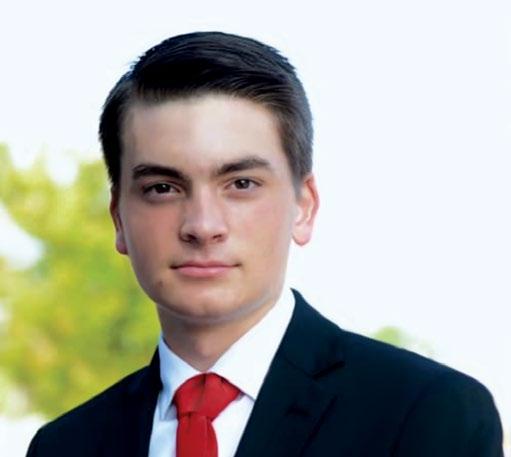
To complete Dalton: A Story of Survival, students spent countless hours working diligently. The editing alone took more than 200 hours, and plenty more time was spent writing the script with a team over Zoom, conducting interviews, and researching Dalton’s history. All of this wasdone without the use of an office except for special occasions when a home office could be set up in their head editor’s house for the team to meet in person.
The students’ dedication to filmmaking has not gone unnoticed, as seen by the film’s award reception from the American Golden Picture International Film Festival and its selection for the Cobb International Film Festival and the Virginia Global Music and Film Festival USA. "It is phenomenal that we were able to pull this off as students who have never done this before. We were the only students participating in the festival we won in, which felt really good for us because we were competing against adults," said Poag. "I think it shows how hard everyone was willing to work and how amazing the story we wanted to tell was. Dalton is an extraordinary city and the story of how it came to be what it is today is amazing. It shows how strong the people here are and have always been."
Team leaders at STEP Studio are now focused on expanding their roots to college campuses across the state like the University of North Georgia and Oglethorpe University. They hope to see independent student films blossom in Georgia, and to eventually turn STEP into a non-profit production company.
Augusta Technical College wants to get their students on the big screen. Beginning this January, the school will be teaming up with the Georgia Film Academy to offer film classes for students interested in the industry and looking for high quality educational experience that will help them find greater opportunities postgraduation. These courses are projected to grow the local workforce and boost the local economy in Augusta.
“I always tell students: If you think about the end of a movie and you see all those credits, all those names, this is preparing you to do one of those jobs,” said Augusta Technical College president Jermaine Whirl.
The classes will be a part of GFA’s film and television certificate program which comprises three courses or 18 hours of noncredit study. Those who graduate from this program will find better chances of stable employment as they have been trained to work efficiently in a film crew and have already developed many abilities.

“And they get paid extremely well,” added Whirl. “You’re talking about hundreds of thousands of dollars’ worth of equipment, and your ability of what to do and what not to do is extremely critical, especially on a movie set where time is money.”
With Georgia’s film industry thriving, Augusta is seeing more economic opportunities through film production, with major companies such as Netflix and Marvel expressing their interest in sourcing production in the city. Recently, film crews have been in Augusta to film the upcoming movie The Hill starring Dennis Quiad along with three other feature films.
These crews have been expressing a strong desire for more lighting and sound technicians, carpenters, and electricians which is the inspiration for the new school program. If Augusta can start producing more workers specializing in those categories like lighting and sound, crews would not have to outsource staff from bigger cities in order to film there, which would bring larger films into Augusta as well as encourage more production companies and studios to open locations in the city.
The goal is to have movies consistently filmed in the city throughout the year. This would cause an increase in economic activity that significantly bolsters the city.

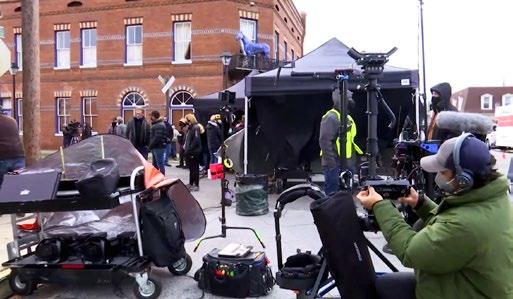
“I don’t think this is a one-time thing,” Whirl said. “If we start to grow a talent pool here, we can really keep these movies coming.”




Latinos in the film industry are not just now joining the party. They have been busy putting in the work all these years earning their seat at the table. Now, they are ready to shatter glass ceilings - even in Georgia. “We have been part of the conversation for a long time. But now… we are interrupting,” says actor Denise Santos, who in the last few years, together with her accomplices, has mobilized to create a home for an underrepresented segment in the industry in Georgia – Latinos. As the industry bloomed with the 2008 tax incentive in Georgia for productions and post-productions brought to the state, certain opportunities opened up for Latinos, and some wheels started promisingly turning, “but we are not there yet,” says Santos, echoing Latino actors and actresses in Atlanta.

In 2020, Sofia Vergara ranked as the highest-paid actress in the world, earning $43 million from her role in Emmy-winning "Modern Family," NBC’s "America’s Got Talent," endorsements, and licensing deals. The worldwide success of the Colombian actress, known for her very heavy Spanish accent when speaking English, sent a message of hope and pride for other Latinas in the industry.
In the same year, Hamilton’s creator Lin-Manuel Miranda made his appearance on the list of highest-paid male actors. Proudly representing Latinos as a Puerto Rican, Miranda ranked 7th on the list, earning $47.7 million - still more than Vergara despite her higher rank on the women’s list.
As promising as it is to see certain Hispanic actors gain national attention, Latinos in the industry are still being marginalized. Hispanics are the fastest-growing segment of the population of the United States, and continue to have the largest per-capita movie theatre attendance among all demographics in the country - making up 25% of all movie tickets sold. However, Latinos and Hispanics are still heavily underrepresented on screen and in the industry as a whole. Research done in 2021 by the USC Annenberg Inclusion Initiative studying 1,300 top-grossing films revealed that in the past 13 years, 43.4% of the most popular films did not feature a Hispanic/ Latino character, and only 3.5% of the films had a lead or co-lead Hispanic/ Latino character.
The struggle is nationwide, but Latin creatives in Georgia are not willing to just sit around and wait for the change to come. It’s time to interrupt.
After years of running into each other at auditions, events, and productions, actresses Santos, Viviana Chavez, and Gabriella Ortiz decided it was about time they started talking to each other. What started as a Facebook group of women who would gather to network over lunch, turned into Latinas in Media Atlanta (LIMA), an organization focused
on advocating for more Latinos in the entertainment industry and creating a place of belonging for minority actors.
Co-founder and co-producer of LIMA, Denise Santos is an Ecuadorian raised in Miami, Florida whose charm is perceived at the first interaction.
Sitting in what looks like an auditioning set up, in front of a soft grey backdrop, with perfect lighting, Santos shares her story. “I have always loved benign on stage,” says Santos. During her high school years, she fell in love with acting, but despite her mother’s support of it as an extracurricular activity, it was not acceptable as a career choice. Instead, she pursued a career in Child Psychology.
It was years later when Santos started participating in plays that she realized that acting was her real passion. “I knew I wanted to keep doing it!”, says Santos with a spark in her eyes. When Santos moved to Georgia in 2009, her husband and daughter strongly supported her return to the stage. “I started auditioning and taking classes, and realized that I could do it,” she says. Bouncing from live theatre, to the front of cameras for film and television, and to sound rooms for voiceovers, the market and the industry were looking promising. However, something was missing. Santos craved a community of Latinas who were on a similar journey. “There were so many actors I would run into in the audition rooms and admired from afar, but we never really connected,” says Santos.
Inspired by powerful Latinas in Hollywood - such as America Ferrera, Eva Longoria, and Roselyn Sanchez who are using their platforms to uplift each other, tear down walls, and make a name for Latinos in the business - Santos started a group for women to network over lunch in Atlanta, “Latinas Who Lunch”. A year later, with the help of two other tenacious women, that same Facebook Group would become a community for talented Latinas in Atlanta.
Daughter of a professional dancer, Puerto
Rican actress Gabriella Ortiz got involved in the arts at a very young age through dance, music, and theatre. “I always knew I wanted to be an actress,” says Ortiz who despite having her mom involved in performing arts, she found herself struggling to get full support for an acting career. “My family didn’t know anything about the industry. They told me I was going to have to figure it out on my own,” she remembers.
After pursuing a career in Fashion Design in Italy, it wasn’t long before Ortiz found her way back into acting. While completing an internship in Florida in 2009, Ortiz built on her acting education. Concurrently, it was nearly impossible to ignore the buzz about the big boom in the film industry in Georgia. “Everyone kept talking about how something big was coming, and how Atlanta was becoming the place to be for actors,” says Ortiz. So, in 2016, after completing her studies, it only made sense for a decisive yearning actress to pack up her U-Haul and head over to the promised land. Not even fear could stop her.
Georgia brought professional opportunities for Ortiz, but it also brought challenges finding a community to feel a sense of belonging as a Latina. “It took a lot of research to find my community where I could bond with people over my culture,” she says with a tight fist to her heart. “I felt alone.” The desire to build the community she craved and couldn’t find, led Ortiz to reach out to a fellow actress who she had been admiring from afar, Viviana Chavez. “We both auditioned for a role in “Dynasty” and when I found out another Latina had booked it, I knew I had to meet her,” recalls Ortiz with excitement. “I felt a little bit like a stalker, but I wanted to connect because I felt alone as a Latina.”
Stepping out of her comfort zone, once again, led the way for something bigger for Ortiz and the industry.
From Uruguayan and Mexican parents, Viviana Chavez is an Atlanta native with the most welcoming smile. But don’t let it trick you. She has portrayed some very angry and serious women on screen.
Like Santos and Ortiz, Chavez
discovered her love for acting in high school. “I wasn’t even supposed to get a role on that first play,” Chavez remembers with a laugh. “The moment I stepped foot on stage on opening night, a switch flipped, and I became obsessed with theatre,” says Chaves closing her eyes reliving the moment. However, Chavez dismissed acting as a career option. “My parents’ dreams as immigrants were about education and they would have wanted me to have a more practical career with job security,” says Chavez, who earned a full ride to the University of Georgia. Searching for a practical career, she once again found herself on a stage. Only this time, she decided to follow her heart and stick with it. “My family had no clue about this world,” says Chavez referring to performing arts. “At the time, my father passed away and my mother just trusted that I knew what I was doing.”
In 2010, Chavez got signed by a prominent talent agency in Atlanta after just cold-submitting. Even though she attributes it to being a scarce face of diversity back then, it has been proven
that it was more than that. Chavez has been booking jobs consistently for the past 11 years, including roles on projects that began to materialize the potential of Georgia in the industry, such as “The Walking Dead," “Dynasty," “Homeland," and “The Resident."
At the beginning of her career, Chavez's ultimate goal was to become an Oscar-winning actor, but through the mentorship of Professor and actor George Contini, she realized that her desire for it had nothing to do with the actual award. “It had everything to do with being represented. It had everything to do with being seen as a Latina who succeeded at it,” says Chavez. In the Academy’s 93-year history, only four Latinos have won an Oscar in acting categories - only one Latina (Rita Moreno, 1961’s “West Side Story”). “I wanted to get the job done,” says Chavez passionately. Discovering her real desire, Chavez’s meaning for success shifted. Her goal became fulfilling a position of power to influence the stories that are being told, “and to give people opportunities which they normally wouldn’t get.”
Connecting with Santos and Ortiz, Chavez found herself heard and seen in ways that she didn’t know she was seeking as a minority actress. With that passion ignited within them, 2018 became a pivot point for each. Latinas in Media was born.
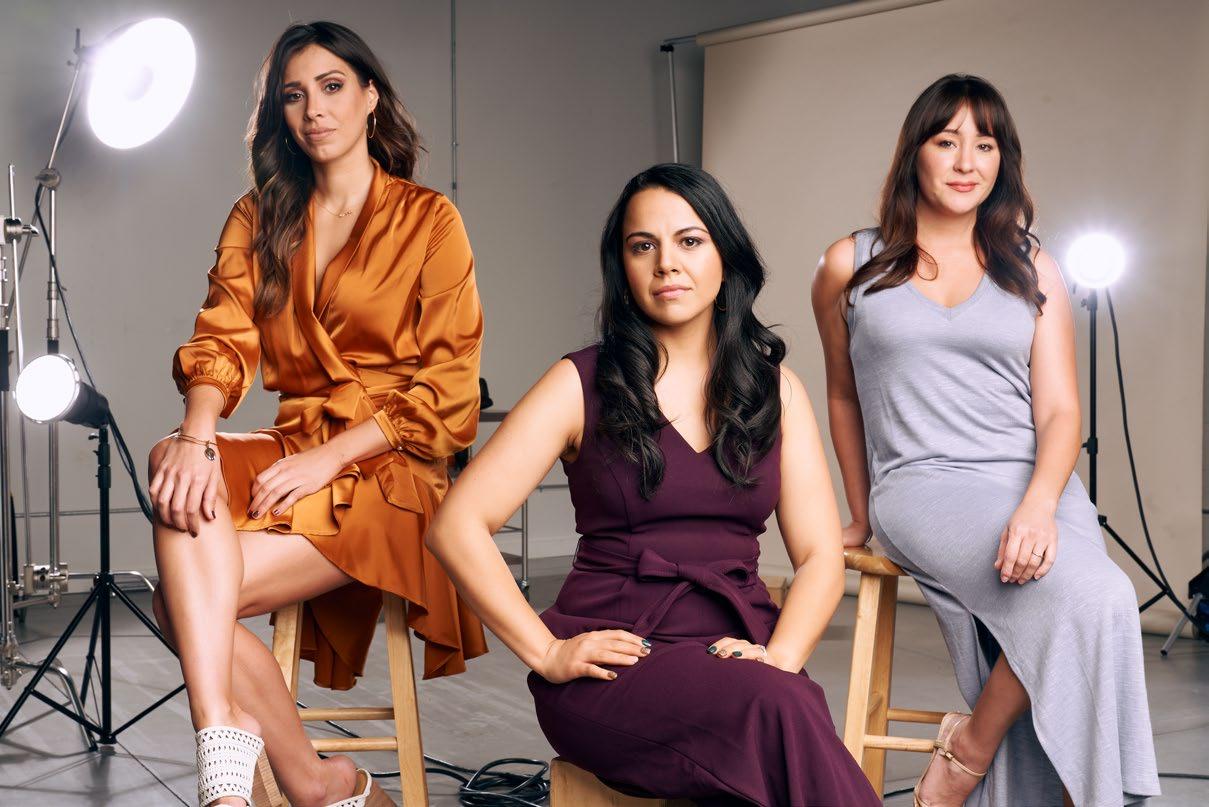
In the Summer of 2018, Santos, Ortiz, and Chavez had their first official meeting as LIMA. “We had a vision. An idea. A possibility. We almost doubted our idea. But thankfully we had each other.” said Ortiz’s social media post with a photo of the three Latinas proudly wearing black t-shirts with white cursive letters that read, “Latinas Who Lead in Media.” What makes LIMA special, is not just the similarities in each other’s upbringing and culture, but the beauty of their differences and diversity of personal experiences that bring value for one another.

Partnered with A.I.R Entertainment and many other creatives in Georgia, LIMA hosted its very first showcase during Hispanic Heritage Month at The Robert Mellow Studios. For the next two years, LIMA provided a platform for actors and creators to showcase their talents, tell their stories, and celebrate each other.
Through the uncertainties of 2020, LIMA didn’t stop. The showcase went virtual offering original works, short films, readings, workshops, and a Latino pro-industry panel. Despite not being able to gather in person, Latinas in the industry showed up for each other. “It’s home,” says Chavez. “It’s a home I didn’t know I needed.”
2021 has been a year of recalibration for LIMA, taking the time to recharge and strategize on what is next for the organization, and how they can continue to serve such an important underrepresented segment of the industry in Georgia.
Despite LIMA being focused around Latinas, the support of various males, Latinos and not Latinos, contributes to the efforts that made it possible. Such is the case of Robert Mellow himself, who, aside from being an inspiration for the founders, happily opens the doors of his studio to give LIMA a platform.
In four-short years, LIMA has become home for many. “I seek out folks who are like me, and have an upbringing like me,” says ABC’s "The Blacklist" Diany

Rodriguez who attended each showcase in support of her local community of actors. “When LIMA came to town, we became much more mobilized.”
As the industry continues to grow in Georgia, Latino actors and creators must overcome key obstacles around negative stereotypes, reputation as local talent, underrepresentation in leadership roles, and even struggles amongst its community. This is where Latinos are interrupting the conversation, demanding their voice is heard.
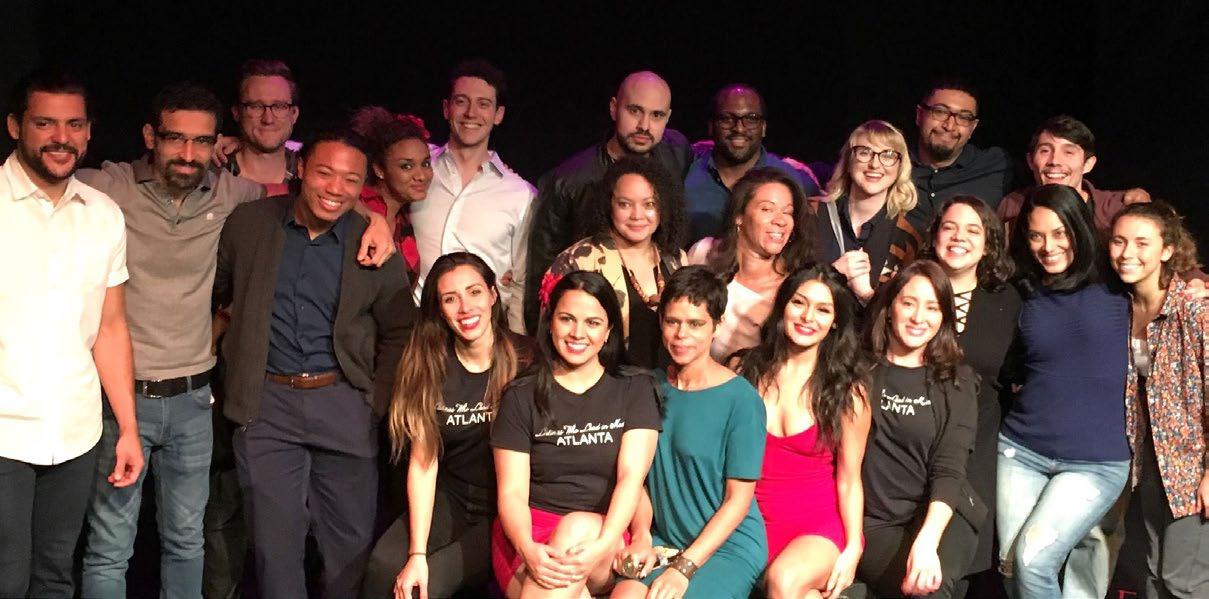
Ending negative stereotypes is a pressing matter in the industry, not just for actors and creators, but for communities.
“Representation on screen matters for our community – it shapes not just how others see us, but also how we see ourselves,” said Eva Longoria, President, and CEO of UnbeliEVAble Entertainment who partnered with USC Annenberg School of Communication and Journalism for the intensive study of representation on screen. 28% of top-billed Latino characters were portrayed as criminals for the past 13 years in top-gross films - 40% of which were tied to a violent crime, according to USC Annenberg’s data. The same research shows that 29% of the Latinas portrayed in the 1,300 top-billed films were sexualized - while none of the Latino male characters
were. Poverty is another cliché for Latin and Hispanic characters on film. A total of 13.2% of top-billed Latino characters in the past 13 years were portrayed as poor or with a low income. A significantly large percentage were given the perception of being outsiders, by portraying them as immigrants or living outside the United States. Only 33% of the Hispanic or Latino characters were U.S. born.
“I am so many things other than just a Latina,” says Rodriguez. “I want to have the same opportunities to audition for those roles which are filled by white actors by default.” The battle to find equality and inclusion in casting is about accurately representing the Latin and Hispanic culture to the world. “When (Hollywood) systemically excludes Latinos or routinely stereotypes Latinos in its products, it contributes to the invisibility and misunderstanding of our community in American society,” said Congressman Joaquin Castro, former Chairman of the Congressional Hispanic Caucus.
The battle for equal opportunities in the industry, and accurate representation is still a long way from being resolved, and Latino storytellers have pen and paper in hand, ready to bring the change. “We don’t get to be just regular humans,” says Rodriguez who has already set boundaries not being willing to audition for roles portraying Latinos negatively. “My agents know it. I won't do those roles.”
If battling against roles that negatively stereotype Latinos wasn’t enough, Latinos are also in the fight to claim credibility and reputation as local talent in the Southeast. Despite Georgia being a relatively new key market for the film industry, proper training and education opportunities for actors have been available and rapidly increasing, providing exceptional tools for local talent to be as competitive as that of Los Angeles and New York.
The sense of depreciation for local talent is a shared sentiment for some actors in the industry in Atlanta, particularly Latinos. “We are not less valuable just because we are from Georgia,” says Rodriguez emphasizing the value of an actor in a smaller market who has had the opportunity to work in various platforms, wearing many hats. “We are not just capable. We are better.” “In Atlanta, we are not actors who are just waiting for the one-liner to come,” says Ortiz. “No. We are ready to work. We are ready to go on set, and we are prepared.”
On-screen representation for Latinos is only one part of the challenge. Over a decade, the underrepresentation of Latinos in leadership roles in the industry has not seen much improvement. “We need more Latinos in suits,” says Ortiz referring to the imperative need for representation where decisions are being made. “We need diversity when it comes to casting directors, agents, and producers in Georgia,” says Santos. “That’s how we need to interrupt.”
The USC Annenberg report showed that only 4.4% of directors in the last 1,300 top-gross films were Hispanic or Latinos - that is 35 directors in the last 13 years. Of that small percentage, only 3% were Latinas. For every 200 white men directors, there has been only one Latina director in the last 13 years. When it comes to producers and casting directors, only 3% of each category were Hispanic or Latino, and predominately male.
Overall, Latinas represented less than 1% of all producers across the last 1,300 topgross films over a decade. The study also proved that when a Hispanic or Latino director or casting director was present, Latin characters and Latin cast notably increased.
As some set their hopes on the change to start from the top, others encourage their community of minority actors to start from wherever they are. “We can do so much as actors,” says Rodriguez. “We can start by valuing ourselves, carefully choosing the roles we play, and negotiating what we are worth.”
The battle for equality on and off-screen in the film and television industry has been fought by many, for a long time. In Georgia, with a rapid influx of talent, the same commitment invested in building a community is the same commitment needed of others to show up and support one another. “That’s where we fail,” says Ortiz. “How do we expect our stories to be heard?”
Minority and underrepresented creators depend on the change that starts from within their community. It starts with accepting and showing up for each other first. “If we as Latinos want more, then we as Latinos need to be more,” says the creator of the locally-produced short film Hispanic Actor, Javier Vazquez, Jr. “Be more active. Be more generous. Be more supportive.” The ask from one actor to another is the commitment to advocate, amplify, and celebrate each other’s work. “The success of one, is the success of all,” says Santos.
Despite the ongoing challenges and obstacles, Latinos in the industry in Georgia have also seen promising advancements that fuel and regenerate hope and vision for the community.
With exposed brick walls, high rustic ceilings, and bright natural light peeking through the windows, the first Latinaowned studio and production company now sits in historic Rome, Georgia, just 90 minutes northwest of Atlanta. Founded
by Tyler Perry Studios’ architect, Maria Guerra-Stoll, Playa Azul Media (PAM) Studios was built with the sole mission to offer development, finance, and studio support to underserved minority communities who seek an opportunity in the film and television industry. Inspired by what Tyler Perry did for his community, Guerra-Stoll decided it was time for her to create a legacy for her community. “There are a lot of Latinos who are invisible, and we want to see if we can tell our stories.”
Pioneers like Guerra-Stoll not only break glass ceilings, sending a loud and clear message that Latinos are present in the film industry in the Southeast, but also carry a lot of influence. “She is ready and willing to walk the walk,” says Latina actress and producer Michelle RiveraHuckaby about Guerra -Stoll. “I love that we get to have someone like (her) in our community, doing the work to open doors for people, and allowing us to do it with her.”
After months of renovations, and with projects already in the books, PAM opened its doors officially in November of 2021 during the Rome International Film Festival. It is exciting to see what is to come.
“I am hopeful for the future of the industry in Georgia. I want it to stay here,” says Chavez who decided on staying in Georgia after all. “My life is here, and I want my job to stay here. I know there is opportunity.”
Looking around, one knows that there is no need to go to Hollywood to meet talented and experienced Latinos in film. Georgia has plenty of diverse actors, creators, and hungry storytellers wanting to be heard. They are no longer waiting for their turn. Latinos are interrupting. “We just need to realize how great we are. We need to believe it ourselves,” says Rodriguez. “We are here. We are working, and we are thriving.”





When animation was first put on the scene many gazed in awe of its creativity and fluid movement. Since then animation has become the medium of choice for those who want to share fantastic fantasies that have come to life for over 100 years. Going from painstakingly drawing

each movement for hours at a time to computer-processed images. The history of this art form is vast and complicated. Maybe even a little messy. But there is no one who has dedicated themselves to this art form more than Mark McCray has.

First getting his start writing a newsletter, called The Best Saturdays Of Our Lives, and currently an awardwinning podcast of the same name which has since been the recipient of the 2021 Miami International Science Fiction Film Festival “DILECTIO SAPIETIAE” Award. The newsletter focused almost exclusively on animation and everything that happened around it. More specifically he talked about Saturday morning cartoons. He would go on to cast a wide net with his newsletter by not only talking about what
was going on in each of the shows, but the strategy the networks would try to use, the rivalries between studios and networks. With enough insight and in-depth knowledge of the industry he was sure to get noticed, “No one was paying attention to kid’s cartoons in the early days. But people wanted to hear and read about what was going on. It was also where my passion was. So I launched the newsletter and sent it to everyone who had their hands on kids' content.”
McCray went on to explain how
complicated and complex the politics of Saturday morning are while providing an example of what you could see in his newsletter,“Back in the day when a Saturday morning show did well, that was no guarantee that the show would be renewed. The budgets at the networks could not sustain buying new series. New shows couldn’t be bought while also trying to get renewals for the returning series.”

McCray brought up, Filmation, a real heavy-hitter in the world of animation. Filmation was an American production company that produced animation and live-action programming for television from 1963 to 1989. “Instead of Filmation banking on a renewal of a particular show. They came up with a technique for creating a new show. One that would guarantee a new set of episodes. Instead of ordering season 2 of "The New Adventures of Superman" in 1966. They would make "The Superman/Aquaman Hour of Adventure." This would allow a pre-existing IP to continue a character’s narrative with a fresh take on the character. McCray elaborated, “Filmation is one of the greatest studios ever as they started trends in animation. They refused to send their animation overseas. Filmation also secured bigger budgets for animation. When you send the animation overseas that’s a bang for your buck system that networks liked."
That all changed in 1976 when "Tarzan, Lord of the Jungle" was released. It included cutting-edge technology and new techniques for that time, was a mic-drop to the rest of the industry. Covering Information like this in his newsletter, McCray would lead down the looking glass into something that could only be brought to life in a dream.After a while, the newsletter got some buzz and lead to a lot of freelancing opportunities and eventually to Cartoon Network”. Landing a job in the Cartoon Network library McCray would pull the tapes of archived episodes or footage and prepare it for an on-air producer to make it into a 15-30 second promo. The tasks that McCray would be asked to complete would range from grand generalizations to intensely tedious and microscopic details,“ Sometimes they would ask me
for characters eating dinner together or characters drifting away in space. They would then rely on my cartoon expertise to then get them the tapes that were needed”. The promos that would be made out of the acquired archive footage would then be used to promote an event that was happening on the network.

But that job was only the beginning of McCray’s climb into the animation hierarchy. What would follow next would be big, “I will always remember the day when Mike Lazzo (Producer and former Executive Vice-President at Cartoon Network) welcomed me to the network as their Head of Programming is a day that I will never forget. I was introduced to everybody and it was a very exciting time for sure. I quickly found out though that a lot of ideas that I had in my head for scheduling and programming were not viable for what was required. I had to learn a lot from Mike Lazzo and my manager Dania Perez".The network’s process begins with a strong show to lead-in for any new series. For example, if "Powerpuff Girls" is getting great ratings then
you’d want to adjust the schedule and programming to fit the format that you’d want to cater to.
Another key factor that McCray learned is The Halo Effect. The Halo Effect is when you have a show with huge ratings. The kids would then stick around for the rest of the programming. “A lot of the job was brainstorming ideas to get the kids to watch our network. There were several strategies to accomplish this. You had your premiere strategy. How were you going to roll out a particular series that was brand new to your audience? What the rollout of these episodes would look like and the premiere schedule would be. That part of the job was a no-brainer. But the hard part came when trying to figure out how do you keep kids coming back and watching.”
McCray and his team would then retreat into their think tank and come up with truly innovative ways to get young audiences into seeing what truly great programming Cartoon Network had to offer. One of the stunts McCray always wanted to do, but never had the opportunity to put into practice was
“Dexter’s Laboratory: Mad Scientist” highlighting Dexter’s more memorable experiments. That’s when the symbiotic relationship between the on-air producer and McCray would come into full focus,“As I said before this is when the on-air producer would then write a 15-30 sec promo.” All of this work is done even before you bring big sponsors or brands to promote.
One of McCray’s biggest innovations was related to one of Adult Swim’s biggest hits. "The Boondocks.” Whenever an episode of a TV show would end, a credit box would appear on the lower third of the screen. McCray was the one who came up with the idea to change it up and preview what the next episode of "The Boondocks “ was going to be. A new idea that was met with warm reception. This was done so that the viewer wasn’t going to go anywhere. It worked so well that they implemented it for the entire Adult Swim schedule.
In 2021 though the word on everybody's mind is, “diversity”. It’s easy to say that when McCray was coming up through the rank of Turner
Broadcasting the racial climate was not what it is today, “When I came there were not a lot of African-Americans in the industry. Even now there isn’t a whole ton. A lot more can be done. The man who mentored me, Lou Shimer from Filmation, brought on more people of color than any other studio back in the day from the 70s through the 80s. Other studios saw what Filmation was doing with diversity and other studios jumped on the bandwagon. Which is great, but nowadays I don’t see as much. Back in the day, there were just more. From voice acting to behind the scenes.”
The good news though is that Africa is becoming a hub for animation and animators. More voices are getting out there. Production-wise there has been an uptake in Africa. African animation is getting internationally recognized. Animators like Ridwan Moshood who is the creator of "Garbage Boy and Trash Can" are finally getting their day in the sun. The world is hungry for new content in the age of COVID-19. "Garbage Boy and Trash Can" is the first African-produced Cartoon Network superhero animated comedy series. It will be produced in conjunction with Pure Garbage, a newly founded animation production business based in South Africa that was formed just to produce the new series, “Unless you have an advocate or someone rooting for you in the right places. It can be very hard to wiggle your way into that space”.
McCray wasn’t the only boy who loved Saturday morning cartoons, but he may have been the only one to call the networks and tell them what he liked and disliked about them. It wasn’t long before he was writing his own newsletter, titled The Best Saturdays of Our Lives, which he circulated to
animation and television executives, networks, studios, and comic book publishers.

The newsletters chronicle the origins of competitive Saturday morning programming—from the 1966–67 season straight through to the 1990s—and they’re compiled in one place for easy reference. So with McCray’s encyclopedic knowledge of the industry, he decided that he would share what he knew with the world. McCray has written a book titled, The Best Saturday Of Our Lives.
You’ll get an insider’s look at the inner workings of the cartoon and television industries, competition between broadcast networks, and how the industry has changed over the years. Mark’s curiosity, probing insights, and love of television, come together to create The Best Saturdays of Our Lives.”
But that isn’t the end of McCray’s endeavors as an author. McCray is officially making the leap from nonfiction to fiction in his newest book,

Paper Boy: Dimensional Adventures. McCray explains, “Rudolph St.Clair had superpowers, fame, and the respect of New York City. Till one day a horrible incident robbed Rudolph of his powers. Rudolph married his college sweetheart, started a family, and moved into the perfect brownstone in Brooklyn. Rudolph then discovered that his apartment was haunted. Family secrets and possible alien threats Rudolph will have to find the courage and strength to survive in Paper Boy: Dimensional Adventures.”
McCray self-described the story as,“ If Superman lost his powers and then came out the other end as Doctor Strange”. The world of animation is vast and big and needs to be taken seriously as a true art form. With the future of this medium expanding. Having a gatekeeper like McCray is something we should all be grateful for.
Paper Boy: Dimensional Adventures will be released January 2022 and The Best Saturdays of Our Lives can also be found on Amazon and The Barnes and Noble online website on February 30th, 2022.
Back in the day when a Saturday morning show did well, that was no guarantee that the show would be renewed."




When this phrase is heard we usually hear it in reference to something obligatory like raising a child. But it usually is never referenced when describing entertainers pursuing their craft. But that is what Women In Music is. A community.

Hadley Poole is the founder and chapter chairperson for the Atlanta Chapter of Women In Music. Women In Music is the largest and longest non-profit for supporting women in the arts.WIM Atlanta has hosted a plethora of events that have advanced the cause of pushing more women in the music industry such as networking events, panels, showcases, and educational materials that are available year-round. Celebrating Atlanta's Leading Ladies in Music, are an example of some previous events organized by the WIM Atlanta team. Poole offered her own insight into this,“I moved to New York and joined the New York chapter in 2007. I then launched an Atlanta chapter in August of 2017, stepping down from the organization and delved more into my music career. The organization as a whole launched 35 years ago. Stretching from Atlanta to India”. Life would eventually have its way and Poole found herself in the music scene in Atlanta. But Poole missed the sense of camaraderie that the organization had provided her, “When I moved to New York I knew two people. New York is just such a big place and when I joined Women In Music and began working with them the world just got so much smaller. I met some of the most amazing people in all different facets of the music industry. My career took me from New York to LA then finally back to my hometown of Atlanta. I just missed what I had gotten in New York and
thought, if I could create five percent of what I felt in New York then I would have achieved something. So I decided to start a chapter here.
The music industry in Atlanta is huge and diverse. It ranges from homegrown hip hop to country and beyond. But no matter what genre you are placating to; it won’t stop you from becoming a member of the organization. All you have to do is go to the website, womeninmusic.org. The benefits of joining the organization speak for themselves. It doesn’t matter if you are just getting started or an industry veteran. You then have access to the members around the world. It’s all about the community,
“Every month there is some event happening, It’s absolutely inclusive. Lawyers, singers, and even more” Poole said. Women In Music doesn’t stop at just “women” it truly is an all-inclusive organization that even men can join, Poole explained, “It’s inspiring and even encouraging. The culture is so amazing. But at its heart, it’s about supporting women in music.
The role that men take within the organization is full membership. But the goal is to feature and highlight women in the industry. The men that join offer support to the female artists in an effort to help them succeed.” Poole also offered her insight into what the state of the music industry is right
now and how monetization of music is helpful towards the success of young female artists. Turning views to money are already difficult. No, imagine how difficult it would be without having a label distributing your work on your behalf. In the age of streaming though it has become a lot easier.
“There was a view back in the day you were only a true artist and make it if you had large studio equipment, a huge record label deal bought you merchandise and put you on the road. Real expensive stuff. That model still exists. Now with monetization, you can become your own agent. You can put something out online. Put something on Patreon. Creating while on the road. NFT’s as well. Monetization has created some different lanes that we as artists didn’t have before. You can now be an individual and independent artist that can make money”.
Poole’s ability though lies in her ability to empathize and put herself in someone’s shows, “As a singer/ songwriter and now chairperson I now know perspective on both sides of the table. On the larger level when we think about strategy on how we connect with the community we aren’t thinking, or how can we serve the business end of the community or how can we exclusively serve the artist. We keep in mind the full community. It helps me better understand how to serve”.

Bearing the future in mind Poole gave a rather interesting hope for what the future might bring, ‘We are a kind of in our 1.0 phase being just four years old. We are the first chapter in the south. I went in with the expectation that people didn’t know who Women In Music was. So I keeping our events completely open to the public. I went around asking others what was/wasn’t working in Atlanta. So we partnered with the Recording Academy and other organizations like Women In Film And Television. My wish is to go into 2.0 beginning next year. We really want to take things to a badass level. Show and bring people into the space that will leave you truly astonished and inspired. We want to start doing things with our other chapters. Connecting with our other chapters like having a listening party or a viewing in Japan. Now that we have built a community we can really start crossing the pond."
In the age of COVID-19. The name of the game is, “adapting”. Almost everybody has had to go through it. But simultaneously we are living in the age of technology and information. So having the organization pivot was a benefit for Poole, “As an artist, I have always wanted to be in the room when art was being created. I wanted to feel the energy and get the people going. But of course, COVID-19 shut all of that down. It threw a wrench into everything, but we did a listening
party on Zoom. We chose four artists to highlight and after their set people would ask questions about the artist's process and the immediate direct feedback. To see that level of engagement was amazing. COVID-19 forced us to burn it all down and resurrect like a phoenix." Part of experiencing music is the connection that you get to make with your audience or whoever is listening to that song at the right moment in their life. Poole shares the same opinion, “I love building relationships with people over music. It doesn’t even have to be singers and an audience. But now that we have the ability to connect online through Zoom, Clubhouse, etc. to form those relationships are even more meaningful now. If we can genuinely connect with each other outside of trying to get somewhere through someone that is what I call a win-win."
Poole’s currency is the relationships that she makes with people, “One of the biggest things that Women In Music has taught me is that whoever you may need is right there. You can reach out. You can Zoom. You can email. Your tribe is there. So many people are afraid of rejection. Just put that away. That is what it’s all about. Just ask for it.”
Some artists may never be able to have a career as Poole has had. She realized that she made the right decision in a crystal clear ah-ha moment when a promoter in Beirut invited her to do show.


“I was flown to Beirut to perform for a nightclub at 2:00 A.M and then flown right back. That was one of the first moments when I figured out what this all thing was about. This was the culmination of recording on a karaoke machine because I didn’t have a proper recording machine. A culmination of walking through a snow blizzard to get to a recording studio. On the other side of the world in a place where I had never been, I was Madonna. They knew my songs word for word. They completely embraced me”. But not only is she optimistic about the future of Women In Music. But she is hopeful for the state of her music as well,
“For the first few years of my career I was very hesitant on who I collaborated with. I didn’t want to take some shows. When people would ask me about how I was doing. I look at two songs that I am finishing with a DJ and another artist. Being able to work with them has been amazing. When I think about music going forward I’m not as concerned about hardlining it. I am not as much concerned about getting on the radio or making sure that I am on tour. It’s more about just doing what I love and incorporating music into it making it a perfect scenario."
“We keep in mind the full community. It helps me better understand how to serve.”
HADLEY POOLE
DreamHack is a virtual reality gaming experience that brings the community to life. A gaming event only comparable to the Olympics. Commonly it is known as the biggest gaming festival in the world. The 24-hour-a-day festival weekends bring together all aspects of gaming in one location. Professional esports events, amateur, and varsity gaming tournaments, and the worldfamous bring-your-own-computer (BYOC) event are all available to attendees LAN parties, cosplay competitions, speaker panels, art, activities, expo, films, and live music. DreamHack has millions of viewers through their broadcast each year. DreamHack was created in 1994 by a couple of friends in an elementary school cafeteria in Malung, Sweden and quickly has become a worldwide phenomenon.
After a respite due to COVID19, DreamHack is returning and it is returning with a punch! A world tour beginning in 2022, which will span from Anaheim, Dallas, Jönköping, Valencia, Rotterdam, Hyderabad, making their debut in Australian debut in Melbourne as well having their very first festival in Madrid, Spain. DreamHack will also find itself back in the city of Atlanta November 18-20, 2022 at the Georgia World Congress Center. Marcus Lindmark, President DreamHack SVP Project and Event Operations at ESL Gaming, “DreamHack creates an arena where you can come to connect, explore, win, play a part, and be yourself through a gaming lifestyle experience — so to postpone Atlanta 2020 was not an easy decision. Gaming brought, and kept, us together over the last year and
a half and it will continue to do so until we return.” This decision was made over the growing cases of COVID-19 in America and all over the world. Bas Bruinekool Vice President of Festivals at DreamHack in a press release said, “All of us at DreamHack stay committed to providing our fans and followers with great experiences, even if it needs to continue in an alternate format for now. We know this decision is heartbreaking, but these are extraordinary times all over the world. The safety and health of everyone involved in these events has never been more important to us than now.”
The Fighting Games Championship is set to commence at DreamHack Atlanta 2022. The last time DreamHack was in Atlanta the Fighting Games Championship was featured in November 2019 which

was attended by 35,000 people. With multiple tournaments throughout the run of the festival. The winner of that tournament ended up being Captain Faceroll with the runner-up being Mew2King in Super Smash Bro. Melee. In Super Smash Bros. Ultimate the winner was Marss and the runner-up was SamSora. In the doubles tournament for Super Smash Bros. Melee the winners were, Ryan Ford and Mew2King, and the runnerup were n0ne and S2J for a prize of $1,000. In Super Smash Bros. Ultimate the American duo Cosmos and Light won with Marss and ScAtt being the runner-up.

The DreamHack Open had eight teams participating playing for a $100,000 prize pool. Hosted by
Richard Campbell with professional commentary provided by Tombizz (Tom Bissmire), Rizc (Niels Topp), BLU (John Mullen), and boq (Mark Wilson). The open was a double-elimination format (GSL) with each Group having four teams. Opening & Winners' matches are Bo1 with the Elimination & Decider matches being Bo3 with the top two teams from each group advance to the Playoffs. The playoffs were single elimination and were in Bo3. First place went to the Danish team Heroic, second place going to the German team Sprout, Croatian team CR4ZY took third place. Fourth place winner was Russian team Virtus. pro. Fifth place was Illuminar Gaming from Poland and sixth going to INTZ from Brazil. Seventh and eighth going
to Triumph and Chaos Esports Club both from the U.S respectively. The prize pool was divided among the winners with $50,000 for the first, $20,000 for the second, $10,000 for the third and fourth with $3,000 for the fifth & sixth, and finally $2,000 for the seventh and eighth.
The official return date will be November 18th, 2022, and will last until the 20th. So strap down as there will be plenty of time for contestants to sharpen their skills in anticipation of this momentous of returns.

Many of us were raised to think of mental health as a taboo subject. It just wasn’t spoken about in households or anywhere else for that matter, and there is still this stigma attached to mental illnesses, getting help, and anything in that same realm that makes people feel a bit uncomfortable. In the past few years or so, it seems there has been a slight shift. More and more people have been seeking therapists or psychiatrists, which to me means that the topic of mental health is being brought to the surface of all of our lives. We are no longer able to put on this facade that everything is perfect and wonderful all of the time…or was that just me? We are being more open and vulnerable with others, with less shame attached. And that, my friends, is okay. Seeking therapy even without a mental illness is something I feel will be the new normal some day.
Someone that has brought mental health into focus is Shanti Das, a former music executive turned mental health advocate. I got to speak with her about her non-profit organization and movement called Silence the Shame. Their mission statement is to “empower and educate communities on mental health and wellness.” Simple as that. But it’s not that simple is it? As someone who sees a

therapist on a regular basis, I know that people still have judgment when I bring it up in conversation. Their first thought is that something must be wrong, but that is not always the case. With Das at the forefront of her movement, hopefully we can see changes in different communities as she is working hard to change the stigma around mental illness and the shame people carry that is associated with it. To do so, she started the dialogue surrounding mental health and wellness, and she hasn’t been quiet about it since. Thankfully!
Das is no stranger to mental health, so this organization is very close to her heart. The very first time she experienced anxiety and stress at its most extreme was in the year 2000. She’d just moved to New York City to work with a major music label and ended up going to counseling for a little while because of said stress, but it wasn’t something that she went to long term, and she really didn’t have a lot of outside support, so she didn’t continue. But in 2009 when she was at the top of her career as a music executive in terms of her title and salary, the amount of stress during the job and stress in her personal life, made her decide to leave that position and move back home to Georgia to be closer to her support system. She notes
that she was doing pretty well mentally for the first few years back home, but in 2014 she had a major setback when her best friend died by suicide. This had a huge impact on Das. She says, “...that kind of sent me into a downward spiral and started making me also unpack a lot of what happened with my father’s suicide.” Das’ father died by suicide when she was only seven months old and that tragedy put a cloud over her family. As all of this pain and grief caught up to her, she started to have suicidal ideations, so she knew that she needed some professional help.
In 2015, she started on antidepressants and began to share her story with friends, family, and colleagues. She even became very open about it on her social media, which made people also open up to her. She realized, “...the more I opened up, the more I felt like people were really grateful for that kind of safe space.” All of this was the start to a very important dialogue that seems to be missing in our communities. Especially for people in music and entertainment; an industry that is not so open about mental health struggles with an environment that expects you to put your work first.
In the same year, Das was doing a radio interview and the term “Silence the Shame” sort of just came to her. She did

a soft launch for her non-profit in May of 2016 during Mental Health Awareness Month. At the time, Nick Cannon was the first celebrity and colleague of Das to support her initiative, and in the following year on May 5th, that became National Silence the Shame Day. Das used social media as a catalyst to spread the word for her nonprofit. She asked different artists that she has worked with during her 20 years in the music industry to get the word out and help post about the day and why it is so crucial to erase the stigma. They received over 90 million impressions, which made her realize that she was onto something. This dialogue. This conversation. This is something that must be brought to the forefront of people’s minds. Self care, mental health, silencing the shame and the stigma of mental illness was talked about by everyone’s favorite artists and influencers on Instagram, which in turn creates a safe space for people to be more open with their friends and family while also beginning their own mental health journey.

Das stated, “I’m not saying I’m the first person in music to talk about it, but I would like to think, in the Black community, I was the first person that got a lot of musicians and influencers in 2017 to really post about it, if nothing more, to show that this is a topic that is just as important as any other diseases or things that we face on a day to day basis. After that, I started doing more community conversations, panel discussions at conferences, and also just focusing a lot around underserved communities, not just the music industry.”
She started Silence the Shame in Atlanta because, as she puts it, “...Atlanta was the epicenter of R&B and Hip-Hop for so long, and me having worked and helped cultivate the southern hip-hop scene, which is now a global scene honestly, I thought, what better city to launch this mental health movement and take it around the world?” Das wants Silence the Shame to be accessible to everyone, but in particular, it started with those in entertainment as she knows that industry on an intimate level.
When asked about Silence the Shame’s target audience she says, “The music industry and the entertainment

industry is an important demographic for us, but we do serve underserved communities on a national scale and hopefully global one day. For example, our very first tour that we did in 2017 and 2018 was a national teen mental health tour…with an organization called Jack and Jill of America, Incorporated. So we did these teen wellness panel discussions and breakout sessions in major cities like Atlanta, Chicago, New York, Washington D.C., and others. We’ve partnered with the AIDS healthcare foundation on doing conversations nationally around HIV and depression in the Black community. In 2020 we were the charitable partner for the NFL players association, so we worked with players of all nationalities and worked with that specific organization to do conversations, and prepare content around mental wellness, so I would say our primary target demo is underserved communities, but secondary is the community at large. In 2020 during the pandemic, we were named as part of Sony Music Publishing’s Social Justice Fund and we created what is called The Soundtrack of Mental Health, which essentially are wellness trainings we have been doing with Sony Music Publishing and their writers and staff. And so in 2021, we started offering it to anyone in the music industry…these are free sixty minute trainings on understanding mental health with self care and that sort of thing. And we will continue those trainings free of charge to people that work in entertainment in 2022.”
As the pandemic wreaked havoc on the rest of us, it “put a spotlight on Silence the Shame.” Because more and more people were isolated during lockdown, people needed their services more than ever. They needed more resources because they were grieving, or isolated, and Silence the Shame was able to help. Das was able to have more community conversations virtually and reach a wider audience. She is also a public speaker, so being able to share her truth and her story with thousands of people in major corporations along with colleges and universities really made a difference. As she said, “the pandemic allowed us to get more exposure to our organization and to help a lot of people. It afforded us an opportunity to spread our mission and to help others.”
Das has many goals for Silence the Shame, “in a perfect world, I’d like to see us have a brick and mortar wellness center in Atlanta and possibly even one that would have workout facilities, and then we’d have a wing for therapy and an in-house psychiatrist on hand. Yoga and meditation. Other self care practices all under one building. And then maybe spread that to other places. Also, being able to offer free therapy for different communities, which I know a lot of people are working towards that as well, so just being able to expand our programs... increase our staff and build our team. In a perfect world, I’d love to have Silence the Shame Atlanta, Silence the Shame New York, and Silence the Shame London, so that we could really do some global work.” I look forward to seeing where she takes this organization as it really seems that they will be able to do some really great work for the community. For now, they have a podcast with over fifty episodes available on your favorite place to listen to podcasts which explore mental health in depth. Das has written a book titled Silencing My Shame, which is a short read about her story and how she started her movement.
The Atlanta chapter of Women in Music just honored Das with the Philanthropy Leading Lady Award, which shows that her non-profit is making waves throughout the industry. She says, “I think we are definitely moving the needle and more than anything, people are recognizing what we’re doing. We’re still

a very small team internally and grateful to do this work and excited about future possibilities.”
Das has been doing the work for herself to be better today and every day, which in turn helps her organization and the work she is putting out there. When she is feeling down, she does things differently than she used to and I wanted to know what part of her growth makes her most proud. She responded, “... now I make sure I’m seeing my therapist on a regular basis or go outside and get some sun and vitamin D if I’m not feeling good. Or write in my journal or call a trusted friend that I can confide in and talk through what I am going through. I now have better, healthy coping mechanisms than I did, so I’m really proud of myself for that because I also lost my sister unexpectedly two and a half years ago. She passed away from a blood clot and that really kind of set me back. We were extremely close and did everything together...even going through that grieving process brought some of the depression back. But I’m now better able to cope and I’m still going through missing her and that sort of thing, but I have more tools now…the other thing I’m proud of are the boundaries that I’m able to set in my life personally and professionally. I don’t allow others to
tell me how I should grieve or how I should feel. The type of time that I put into self care for myself; that is no one else's business or responsibility, and frankly I am very unapologetic about my wellness. So, I’m proud of that because that wasn’t always the case, and working in entertainment, a high profile industry, it was always work work work, and it was never encouraged to focus on yourself. And although I don’t work in music I still do a lot with the entertainment industry around mental health and wellness now… but again I am very quick to say I can’t do that call over the weekend because I’m with family…the old Shanti would be like, okay sure and I would just stress myself out all the time for everybody else but never take into account my own feelings and I’m not doing it anymore.”
I think we could all learn a bit from Das’ growth through her mental health journey because healing is not linear, and neither is this roller coaster called life. I believe that her organization will help many, and if you need any resources to get help or if you just want to donate to a good cause, you can visit SilenceTheShame.com and find the information you need.
"I thought, what better city to launch this mental health movement and take it around the world?”
Shanti Das
























